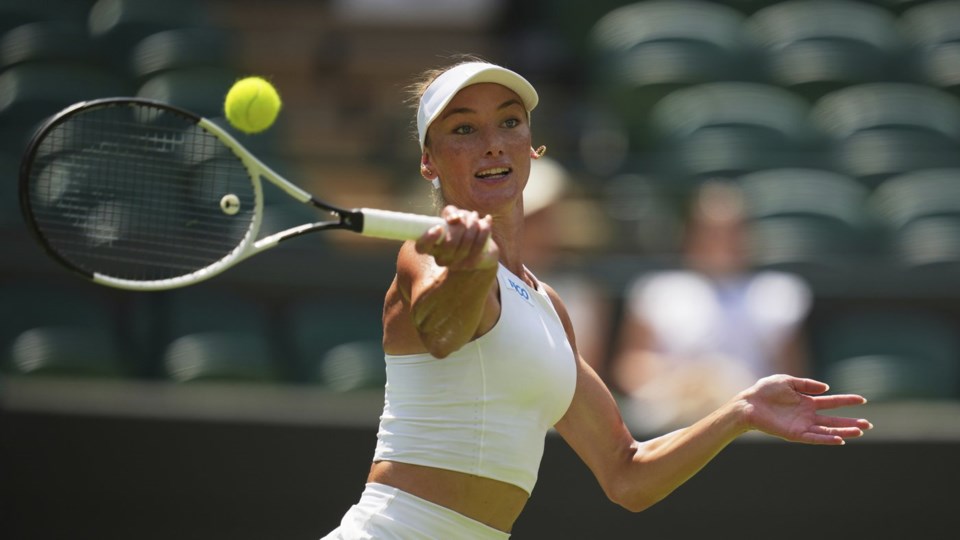MONTREAL — Carson Branstine remembers collecting cans and bottles with her mother and two sisters to help pay for gas and groceries after her family “lost everything” about a decade ago.
At the beginning of this year, she was modelling, teaching tennis and delivering food for Uber Eats to fund her fledgling tennis career — one that, beyond the financial barriers, was interrupted by a long string of injuries.
It hasn’t been an easy road, but Branstine says doing it the hard way is paying off.
"I didn't have any shortcuts to get to where I am, and I think that's made me really tough, to be able to compete and beat girls that have everything," she said. "They have all these fancy coaches and stuff, and then it's just me."
A confident self-starter, Branstine has mounted a spirited defence against obstacles to get to centre court.
"Nothing really fazes me," she said in a phone interview. "I don't care what it takes to win. Like I'll literally fight my brains off until the last point, I don't care."
Branstine competes for Canada, but she grew up in Orange County, Calif. Her mother, Carol, is from Toronto.
A 24-year-old dual citizen — and cousin to Los Angeles Dodgers star Freddie Freeman — Branstine enters the National Bank Open as a wild card this weekend in Montreal, riding a wave of momentum after sweeping through Wimbledon qualifying last month.
The big-serving Branstine defeated French Open semifinalist Lois Boisson and longtime friend Bianca Andreescu en route to her first Grand Slam main draw.
Then she lost in the opening round to world No. 1 Aryna Sabalenka — on Court No. 1 at the All England Club — to cap a whirlwind few days.
"Took me a good week to fully settle down and be able to sleep well at night without my brain running like, 'Oh my gosh, what just happened?'" she said. "Now that it's over … reality sets in that I'm still ranked (191), there's so much to do before actually making it.
"I always thought I should be top 100 and it was just a matter of time, or I was injured or whatever it was. Now that it's happening and I'm not just winning matches, I'm winning really difficult matches back to back, it's proving to myself that I'm exactly where I should be."
Branstine always believed, because she’s been among the world’s best before.
The five-foot-11, right-handed hitter ranked No. 4 on the ITF’s junior tour in 2017, a year she also won two Grand Slam junior doubles titles with Andreescu.
Rather than jumping directly to the pros like many of her contemporaries, Branstine took the college route, a decision shaped largely by her injuries and the high cost of globe-trotting on the tennis circuit.
Branstine said her family’s financial status growing up was "middle-class for the most part." She even attended a private school for a few years.
But when she was about 13, everything changed.
As Branstine describes it, her father Bruce, a financial adviser, "was really fighting for us and trying to do something big, and things just didn't work out."
"My family lost everything," she added. "It went from living a very middle-class, solid, stable life to having to eat at my grandma's, and my parents couldn't even hardly pay for gas.
"I think a lot of people look at me and they're like, ‘Oh, you're from Orange County’ and all this stuff. It's not as glamorous as it looks when your parents are living paycheque to paycheque."
In 2016, Branstine moved to Montreal to train at Tennis Canada’s national centre and began representing her mother’s native country the following year.
Representing Canada over the United States was something she had envisioned even in her early tennis days.
"I'm a first-generation American on my mom's side of the family, and it's a way of honouring that. And it's like, I am Canadian at the end of the day, I truly feel like I identify as a Canadian," she said, giving credit to Tennis Canada for its support since "Day 1."
"I love playing for Canada. It's the best thing ever."
Valérie Tétreault, a former player who now serves as tournament director for the National Bank Open in Montreal, remembers Branstine arriving on the Canadian scene with powerful groundstrokes — and isn’t surprised to see her rise up the ranks.
"Speaks to the fact that you should always continue to believe in yourself," she said. "That was a great effort even against Aryna at Wimbledon. I didn't feel at all like she was overpowered on the court.
“She can see that there's a path, there's a way that she can get to the top 50 and then really make a living out of the sport."
As a next step to reach that goal, Branstine is investing in her career and hiring Belgian coach Gerald Moretti for the Montreal tournament.
"I can only afford that for however many months and weeks right now," she said. "(But) I know if I want to make it top 100, top 50 and beyond, you have to do things the right way. There's no cutting corners."
The recent success is also growing her following and opening the door to more opportunities for brand deals. She also plans to continue balancing her tennis career with modelling.
The Uber Eats deliveries?
"Absolutely not," she said. "That ship has sailed."
This report by The Canadian Press was first published July 23, 2025.
Daniel Rainbird, The Canadian Press




